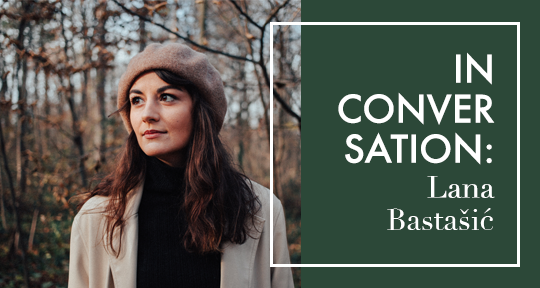Lana Bastašić’s novel Catch the Rabbit, published this year by Picador (UK) and Restless Books (US), has launched the author and her work into the orbit of contemporary world fiction. Translated into English by the author herself, the book delivers an unprecedented and riveting tale of female friendship, which spans the recent history of the Balkans. Best friends Lejla and Sara, a Bosnian Muslim and a Serb, whose strong yet strained bond suffers a twelve-year discontinuation, reunite on a quest for the missing pieces in the puzzle of their personal lives in post-war Bosnia. Here, Bastašić discusses her writing process and translating the book into English, as well as the possibility of catharsis in contemporary Balkan fiction—at a moment when ongoing political and social processes provide none in real life.
Jovanka Kalaba (JK): Catch the Rabbit, which came after two collections of short stories, a collection of poetry, and a book of stories for children, won the 2020 EU Prize for Literature for Bosnia and Herzegovina and was shortlisted for the NIN Award. Moreover, it has been widely read in the countries of former Yugoslavia. How do you understand the success and impact of the book?
Lana Bastašić (LB): In the past three years I have found myself in a very peculiar situation of having to explain or justify the success of my book. It was usually male journalists in the Balkans who would ask, “How do you explain this?”—the underlying assumption being that there is something surprising or unnatural about a young woman writing an internationally successful book. It simply doesn’t happen that often in the Balkans because we are faced with a thick firewall of institutionalized patriarchy. I didn’t make it through the firewall; instead I took another path, translated my own book, and found an agent in another country. But the most difficult part was not about getting published elsewhere. It had to do with battling impostor syndrome, becoming assertive, and believing that my work deserved to be read.
This is the battle all of us women writers in the Balkans have to fight within ourselves—to silence the centuries-old voice inside telling us we can’t write. Once I killed that phantom, I could do anything. And I did. The problem I am witnessing now is not about being successful or unsuccessful but about the language used to describe my success. My male colleagues in Serbia are usually “the biggest new talent” or “the most authentic new voice” and, if older, “genius,” etc. My female colleagues and I are simply “literary stars”—a category that says nothing of the quality of our work but simply states that we are popular. However, I can’t spend too much time dwelling on this, otherwise the phantom reappears and paralyzes me.



